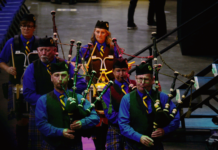
Native American Heritage Month celebrates the traditions of the indigenous groups, showcasing their culture and educating the general public of their history. This also acknowledges the various adversities and challenges they have gone through throughout history and in the present.
Native American Student Programs (NASP) organized an event, with the help of ASPB, to begin the celebration of Native American Heritage Month. NASP brought Raye Zaragoza, a 26-year-old folk singer and songwriter who writes songs focused on social justice that incites a powerful message that challenges and inspires people. “My song ‘In The River’ is definitely one that is rooted in indigeneity. The song was originally written for the Standing Rock movement and represents the resilience of Native American people,” stated Zaragoza.
The performance officially began at 12 p.m. when Zaragoza performed her first song, “Warrior.” Zaragoza chose to open with this song because, “As college students, you’ve been dreaming about this time in your life for forever, and now it’s here and it’s kind of terrifying,” she explained. The artist reassures students that although her song is about her tumultuous experiences of adulthood, she is a warrior and believes she has the courage to conquer her fears and challenges.
Zaragoza comes from a background of both indigeneity and immigrants. In an email to The Highlander, Zaragoza said, “My mom is an immigrant from Japan (moved to the US when she was 3) and my dad is from the Bay Area but is of Mexican & Akimel O’odham descent.” Akimel O’odham, or River People (formerly known as Pima), are a group of Native Americans that inhabited central and southern Arizona. “I like to think that I represent a bridge between indigenous people (my dad’s side) and immigrants (my mom’s). It means a lot to me to tell their stories and show the resilience of marginalized minorities,” continued Zaragoza.
Joaquin Tarango is one of the program coordinators of NASP. Tarango explained why NASP chose to bring Zaragoza specifically, saying, “She’s done a lot of protest songs and has been out in the community. She’s one of the few Native American artists out there and we thought it would be awesome to put her out. She was actually out here 2 to 3 years ago, students loved her then and we thought ‘Let’s bring her back out.’” Tarango also believes Zaragoza carries a powerful message in her songs, which was another reason NASP wanted to showcase her performance.
Zaragoza was also able to gain participation from the students with one of her songs, “Fight For You.” She encouraged her audience to shout “Stand up, fight back!” at a certain point in her performance. Because her songs have the intent to inspire people, she also receives inspiration to produce compelling and influential pieces. “I take inspiration from everything around me. But I love writing songs directly inspired by my experience as a woman of color. It’s a point of view that is so often ignored and I want to do my part shining a light on our stories,” said Zaragoza.







